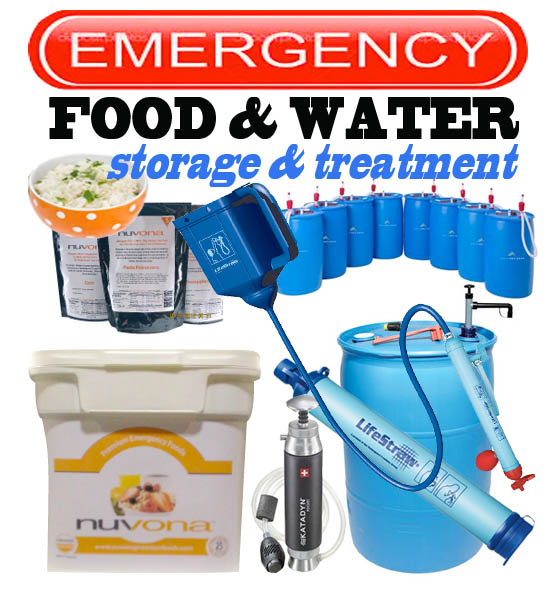
When disasters strike, you must have an emergency food and water supply in your home/automobile and even a small supply at your workplace/business.
In many cases during large-scale emergencies or disasters, food will disappear from supermarket shelves and deliveries will be disrupted and scarce.
https://www.youtube.com/watch?v=DugAVNVApwk
Water treatment facilities may also cease to function due to power outages (blackouts) or damages produced by the disaster.
Your tap water may not be safe to drink. In the case of a radiological emergency, even boiling will not sufficiently clean your water and render it safe for consumption. If you don’t have an emergency water supply, you may be forced to either consume contaminated water. This could produce severe almost immediate illness or future diseases.
Proper food, nutrition and water are your first line of defense for your health when disasters or, other emergencies strike!
SECTION 1. EMERGENCY FOOD & NUTRITION
The I.P.N. strongly recommends that every home must have an emergency food and water supply that can provide all of the occupants with a minimum of two weeks of water and food.
We would prefer a month, however we understand that in our shaky economy many people don’t have the resources to purchase a months worth of supplies. Two weeks is better than one, or none.
It’s important to add that an emergency food supply is great to have during an economic crisis. When money isn’t available to purchase food, it is wise to have emergency food stored away.
When choosing emergency food, you must consider the following factors:
1. Nutritional Value. During disasters, your body is subjected to high levels of stress. The food that you eat during this difficult period must be very nutritious and, provide your body with the extra energy it needs to perform the many strenuous tasks that disasters and emergencies almost always manifest. Good health is by far, your most indispensable commodity — and, is the foundation that your entire life rests upon during turbulent times.
2. Shelf life – You must know how long your food can be stored. You must also consider what the ideal temperature and location for storage is along with the durability of the package it is contained in.
3. Taste – Your storage food should be of a type that you enjoy.
4. Value – You should select a food that has the highest nutritional value, longest shelf life, best taste for the lowest price.
The I.P.N.’s selection is Nuvona Premium Foods.
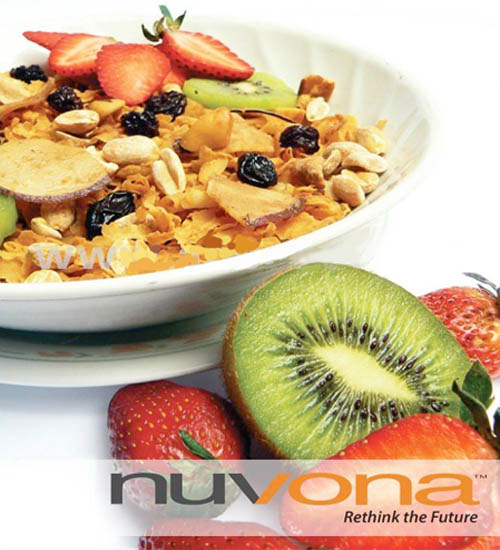
Why? Over the course of our 23+ years of operation, we’ve tasted pretty much all the top brands of emergency food. Many are delicious and nutritious, but pound for pound don’t have all the qualities that Nuvona Premium Foods have.
This includes the fact that they use non-genetically modified food (Non-GMO) an only the freshest and best ingredients.
The food is also dehydrated and also freeze dried. This extends its shelf life. The packaging is extremely durable, it is relatively inexpensive, offers many varieties including vegetarian meals and, it tastes great.
The CEO of Nuvona Preston Sallenback is also dedicated to providing the public with the highest quality product.
He states “When emergencies happen and stress is at an all time high, food will be one of the first things on your mind and one of the highest priorities, but where are you going to find it?
Are you going to be like the rest of the people in your area and rely on someone else like FEMA or some other governmental agency to come to your rescue? If so, I’d reconsider that idea because it isn’t going to happen.
Having just witnessed the chaos shortly after Hurricane Sandy leads us to believe we must be self-reliant and not dependent on anyone but ourselves, but that would take some planning ahead and did all the homework for you and found the best solution out there, Nuvona Premium Foods.
What sets Nuvona apart from all the others is their premium quality non-GMO ingredients and true gourmet tastes not to mention the fact that they’re simple to prepare! Just add water! Nuvona foods also have a 25+ year shelf life, no MSG, no trans fats, no cholesterol, low in sodium, low in fat, high calorie & fiber meals that use Sea Salt and come in both Gluten Free and Vegetarian varieties.”
This section will assist you in building the strongest foundation possible by providing you with the information, and products you need to get the job done properly.
Proper nutrition and physical fitness walk hand in hand. You shouldn’t have one without the other. Physical exercise will increase your body’s need for nutrition and, you must make sure to provide it with the extra vitamins and minerals that it will require to function optimally. This begins with establishing a balanced diet with the basic food groups:
Fruits:
Vegetables:
Grains
Protein
Legumes
Fish, Poultry
Red Meat (for those who must)
Dairy* (other alternatives are better , such as Rice Milk)
Fruits vegetables and grains are foods that are high in fiber and complex carbohydrates. They are also low in fat, cholesterol free and should constitute about 65 percent of your diet. The other thirty-five percent can come from the protein you take in from legumes (beans) nuts, fish, poultry and — if you must, very lean cuts of red meat. Dairy products will supply your body with other essential minerals and vitamins although they should not be consumed frequently because of their high fat and cholesterol.
A vegetarian (or even a semi-vegetarian) diet supplemented with vitamins your best bet for optimal physical performance. Many still believe that a vegetarian diet translates into eating unappealing food. This misleading notion got started back at the beginning of the “health food craze” in the late 60’s when the “flower children” or “Hippies” started to adopt vegetarian diets that were to say the least, more than a little bland.
Back then, vegetarianism meant bean sprouts, dry brown rice, plain tofu, carrots and other cuisine that rabbits would find delicious, but way too plain for the human palate.
This is no longer the case. Vegetarianism has crossed into the mainstream. Most of the products on the market today tastes just as good and even better than junk food. This is especially true when you know what to buy. If you are a die-hard carnivore, there are even meat substitutes that you can purchase at your local supermarket such as vegetarian burgers that can taste just as good as regular ground beef.
Practically every type of meat is available too, from Pork to duck — and, there are many other products to choose from. Here are a list of a few other companies that sell great meat substitutes:
There are a few drawbacks to eating large quantities of processed Soy based food that you should be aware of: Soy contains natural chemicals called phytoestrogens such as geinstein, diadzein and others that mimic the female hormone estrogen. For example, two 8 oz glasses of soy milk per day over a period of four weeks (one month) can actually alter a woman’s menstrual cycle. When consumed in moderate quantities, soy can produce many types of health benefits.
In Japan where soy protein is a dietary staple. the incidence of breast and prostate cancer is much lower than in meat eating nations. The soy (along with the other traditional foods like seaweed) may help to provide some protection from these diseases.
When consumed in large quantities, the processed soy has less attractive effects.
It contains enzyme inhibitors that can block the absorption of protein and stunt growth. It also contains a protein called hemagglutinin that interferes with the red blood cells absorption and distribution of oxygen throughout the body. This is why Soy milk should only be used sparingly by babies and growing children. In their case, the drawbacks can outweigh the health benefits.
Remember, the traditional Japanese diet is much different that the western diet and so is the soy that they eat. The major component of most of the western products is Soy protein isolate. The form of Soy that is consumed in Japan is a natural and fermented type. This is the process that neutralizes the hemagglutinin and other harmful substances.
This is why you should:
Moderate your processed soy intake!
Always purchase the products with the least amount of chemical additives. They should also be made from organic ingrediants. It might cost a bit more, but the extra health benefits make up for the added expense.
Try to learn how to cook the traditional meals of Japan, India and other cultures that include soy protein in their diets.
Taking these simple bits of advice can help you to draw the best benefits from a diet that includes meat substitutes. Another positive benefit of being a vegetarian is your health. On average, vegetarians are much healthier than meat eaters. They have less heart disease, cancer, diabetes, lower cholesterol levels and blood pressure. They are also thinner and look healthier than your average flesh eater — when they are careful to supplement their diets with the proper vitamins and minerals.
Vegetarians must take the extra time and effort to pay close attention to their nutrient intake.
There are different types of vegetarian. They are listed as follows.
VEGANS
These are the ultra-orthodoxy of the vegetarians. They don’t eat, drink, or even wear anything that comes from animals. Sir Paul McCartney is undoubtedly one of the worlds most famous vegans.
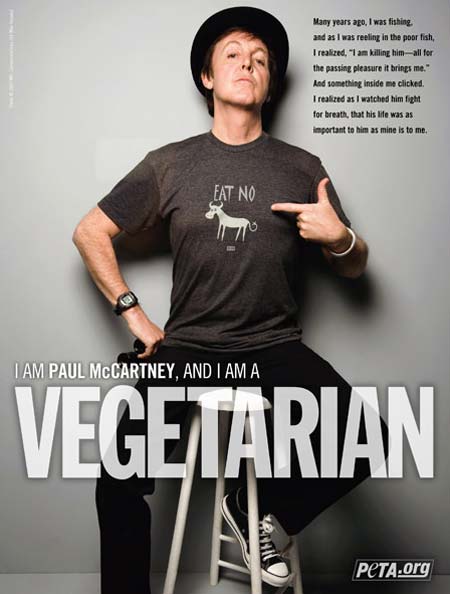
LACTOVEGETARIANS
This particular type of veggie will eat dairy products. Lacto-ovo vegetarians they include eggs & dairy products in their diet.
SEMIVEGETARIANS
This is the category that most of you would probably easily fit into.
Semiveggies have a diet that is primarily vegetable fruit grain and dairy products with the occasional fish meat or chicken meal thrown in. This is a diet that is very easy to adapt to and it would do your health an awful lot of good if you did.
If you become a vegan you should supplement your diet with vitamins, specifically B12, D, folic acid and calcium. Deficiencies in vitamins B12 can make you anemic and degenerate the central nervous system. Make sure that you take in plenty of protein. A great source is legumes, and grains.
Learn how to prepare the meals by getting hold of a good vegetarian cookbook.
Having a different variety of meals will help to insure that you get the full range of nutrients and keep your diet interesting.
To help you get started, here is a list of some of the I.P.N.’s favorite vegetarian cookbooks and general information sources:
The Best of Vegetarian Cuisine
By Sarah Brown
Publisher, Random House New York
200 simple recipes.
The Higher Taste
Publisher, the Bhaktivedanta book trust
3764 Watseka Ave Los Angeles CA 90034
This cookbook has been around forever. If you are partial to Indian food, It has some really great recipes that can save you the time and trouble of visiting a restaurant.
The Vegetarian Times
Vegetarian Times Inc.
4 High Ridge Park, Stamford CT
6905 Subscription Rate 1 year (12 issues)
$29.95 for orders call 800 829-3340
U.S. and Canada. 904 446-6914 Foreign
The North American Vegetarian Society
Box 72, Dolgelville NY 13329
(518) 568-7970
The Viva Vegie Society
Contact: Pam Teisler
www.vivavegie.org
This organization has written the most convincing argument for vegetarianism that I have ever read. It is called 101 reasons why I am a vegetarian. You can order it by sending 3 dollars to the following address:
The VivaVegie Society
Prince St. Station
P.O. Box 294
New York, NY 10012.
U.S.A.
BON APPETIT!
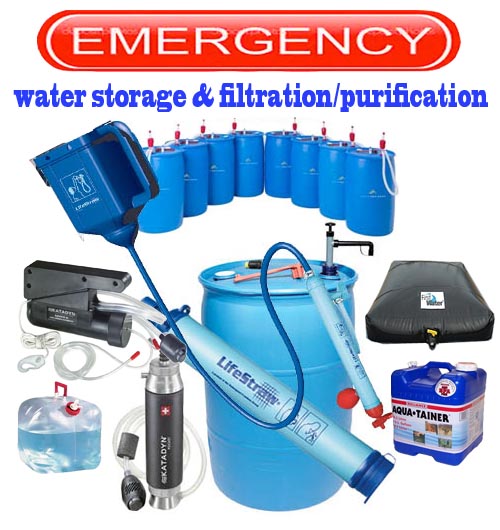
SECTION #2 EMERGENCY WATER STORAGE & TREATMENT
Every home must possess an emergency supply of water and the ability to filter and/or purify it. There are no exceptions to this rule. An average person can live for over a month with no food, but only 8-14 days without water.
Disasters often damage water treatment plants rendering them inoperable. Electrical pumps may also be temporarily inoperable or, destroyed interrupting the flow of water to your home. Toxic chemical spills, radiological & biological emergencies can contaminate reservoirs rendering the water undrinkable.
Emergency water supplies and filtration/purification equipment can help you survive an emergency or disaster by providing you with a stand-by reserve that can be used anytime you need it; or with the ability to filter/purify water that may be contaminated.
Each home should have an emergency water supply that can provide each occupant with a minimum of:
One gallon of water per person/per day.
It can be stored in:
Store your water in a cool area with no insects or vermin. If you use a plastic barrel, avoid heat & direct sunlight. Make certain to cycle your water, that is use your supply frequently and immediately replace whatever amount you use with fresh water.
If you don’t or cannot, utilize a water stabilizer.
You must also have the ability to filter or purify water. This is in the event that potable (drinkable) water cannot be found and you are forced to utilize water that may either be contaminated with biological or chemical impurities or, is questionable.
There are many different types of water filters/purifiers. You must choose a unit(s) that require no power, can filter microbiological, chemical, radiological contaminants and also volatile organic compounds VOC’s.
The best filters available today are:
http://www.youtube.com/watch?v=OyzLEeAgsks&list=UUO9N-LL9r9wYus6Po4YhBWg&index=8
There are many others available including small UV hand held water purifiers. To select the proper filter for your needs and budget, you must research this area to learn what suits you best.

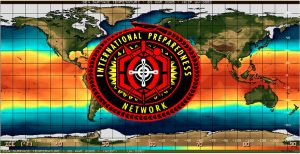
More Stories
Top Ten Prepper Shelfies That Would Make You Jealous